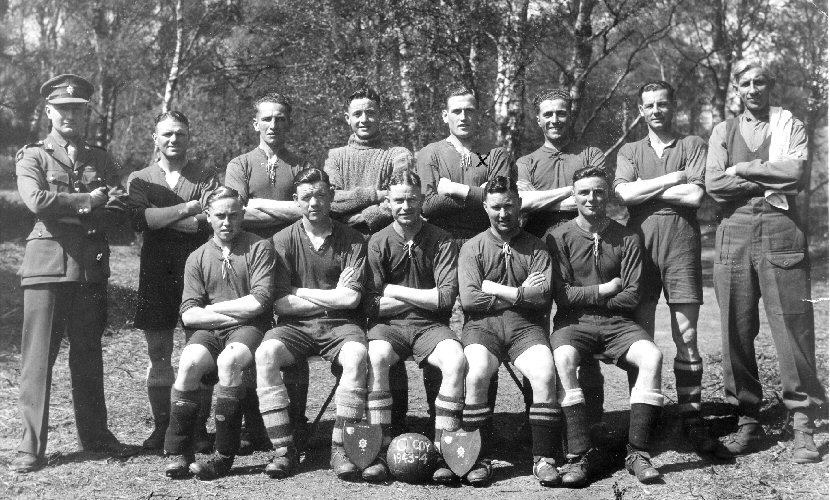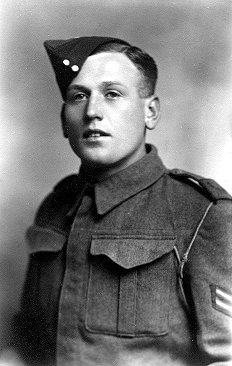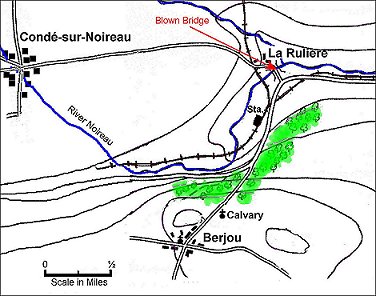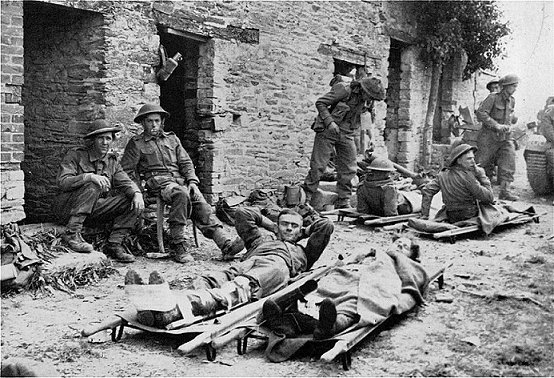Wounded in Action (N.W. Europe 1944-45) - 1st Battalion Worcestershire Regiment
Sergeant Albert Greatrix (5254906)
(13 platoon, ‘C’ Company)
At the beginning of 1943 Albert Greatrix was a corporal with 14 platoon. He was a keen sportman and was a member of ‘C’ Company football team. By 1944 he had moved to 13 platoon with the rank of Sergeant and landed with them in Normandy in June 1944. On the 9th August 1944, ‘C’ Company were given the task of clearing the enemy on the road to Le Plessis Grimoult in the area of La Varinière. They went into the attack with adequate tanks, and with artillery and mortars on call, but with little or no information as to the actual enemy positions. Spandaus, concealed in enfilade positions, and enemy artillery observers took their toll, and after a slogging match lasting several hours the ‘C’ Company had suffered between fifteen and twenty casualties and had to be withdrawn or be completely decimated. It was during this action that Sergteant Greatrix used the P.I.A.T. for clearing the enemy from sunken lanes and foxholes with great success. He was later awarded the Military Medal for his brave actions. A week later Albert was severely wounded by enemy machine gun fire while carrying out a reconnaissance at a crossing on the River Noireau. Albert recalls what happened in his own words: "On the 15th August 1944, the Battalion had received ordered to cross the River Noireau, a small tributary of the Orne which runs in a deep and densely wooded valley, and head for Berjou. On the other side, southern bank, of the river there was high densely wooded ridge. A/Major Harry Matthews was now commanding ‘C’ Company asked me to go down and see if any soft transport had crossed the river, which I did. I found that the small bridge was blown and nothing had crossed the river and so I started to make my way back up the hill to report my findings. As I walked up the hill I noticed a German with a machine gun (Spandau) on the track by a gate. Having seen me and before I had chance to take cover, he let me have it. I was hit 7 times – 5 bullets to my body and 2 to my right elbow. I fell to the ground but managed to crawl away. As I pulled my self along the ground they did not shoot at me again – to this day I could never work out why. |
Sgt. Albert Greatrix, M.M. |
River Noireau and advance to Berjou |
I continued to crawl through two wheat fields and when I was out of their sight I managed to get to my feet and made my way down to a Mill where I found R.S.M. Hurd. It was now about 9.30 a.m. and there was no transport available so we just had to sit and wait. Finally, at about 4.30 p.m. some transport arrived and I was loaded on to a stretcher on top of a jeep together with another wounded chap. I recall the jeep driver was called Hall. I was then driven to a very large field Hospital and was operated on to remove the bullets. I then had to remain there for about 3 weeks before finally being flown back to England in a Dakota. On the plane back there was a nurse with us in charge. Somebody said to her “What will happen if the plane is attacked?” she replied “I will draw my pistol and shoot them down!”. Back in England we landed at Lyneham airbase near Swindon. As I was been carried off the plane I was approached by Mr. & Mrs Richards, they came across to me and said “your Worcesters aren’t you?” yes I said. They then introduced themselves to me, they were the parents of Lieutenant Richards who had been wounded in the foot and arrived back only a few days before me. It turned out that Mr. Richards was the Vicar stationed at the airbase. |
After arriving at Lyneham I was loaded on to a troop train to take me back to Birmingham. On the way the train passed though Cheltenham, as we approached Birmingham it passed though the station at Honeybourne, which was my home village. Then on to Birmingham where I was finally taken to West Bromwich District Hospital where I stayed for a month before being moved to a convalescence home in Bromsgrove (an asylum which had been commandeered for this purpose). There I received regular physio treatment and was eventually discharged by the Medical Board and finally arrived back home in November 1944."
* * * * * * *
|
Battalion R.A.P (Regimental Aid Post) south of Caumont, France (August 1944) |

'C' Company Football Team 1943-44
Back standing: Major Johnny Gutch, Pte. Ted Munn, Pte. Geoff Williams, Sgt. Albert Greatrix, Sgt. Jimmy Lane, Pte. P. Oakham, CSM H. Burton
Front row seated: Pte. Cross, Pte. Jimmy Branch, Pte. Sam Williams, Pte. Ken Penny, Pte. H. Harrison



